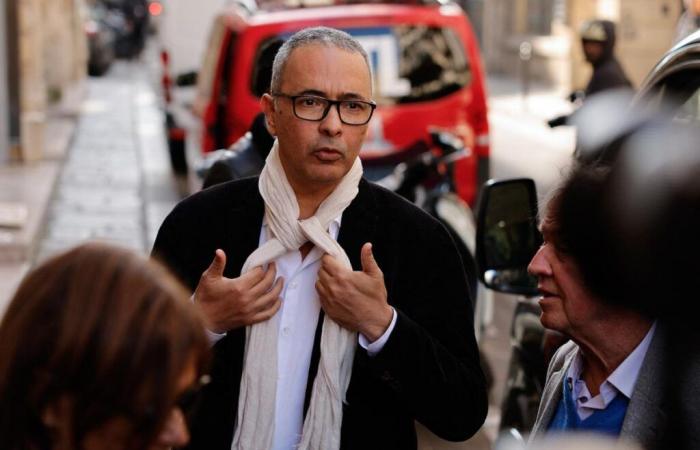
Writer Kamel Daoud, winner of the Goncourt Prize, upon his arrival at the Drouant restaurant, in Paris, November 4, 2024. GREGOIRE CAMPIONE/AFP
Facebook Twitter E-mail Copy link
Send
Free access
An Algerian survivor of an attack accuses the writer of having exploited her tragedy without her consent to write his novel on the civil war of the 1990s. Gallimard, Kamel Daoud’s publisher, speaks of “defamatory” attacks.
The story started spreading like wildfire this weekend. Friday, November 15, the Algerian television channel One TV broadcast an interview with Saâda Arbane, victim of a terrorist attack during the Algerian civil war in the 1990s. Survivor of an attempted throat slitting, the young woman speaks today thanks to a cannula. His words, although difficult to hear, could have a devastating effect on the writer Kamel Daoud, who has just received the Goncourt prize for his novel “Houris” (Gallimard), a book on the “black decade”, a taboo subject in Algeria .
Also read
Interview Kamel Daoud, Goncourt 2024: “This prize gives meaning to all the writers we seek to silence in the Arab world”
Free
Read later
The thirty-year-old, who saw part of her family being massacred, believes that Kamel Daoud appropriated and exploited her story to write his book, whose narrator, Aube, is also the survivor of a throat slitting. . Saâda Arbane thus listed the similarities between the character in Daoud’s novel and her own life: “the scar on the neck, the physical after-effects of a failed throat slitting, the absence of voice, the trauma of a family massacre”. Like her again, Aube runs a hair salon and has tattoos.
More seriously, Saâda Arbane affirms that “Houris” takes up more personal elements, in particular his relationship with his mother or his desire to have an abortion. Facts that she would have confided during therapy, in 2015, to a psychiatrist who would become the wife of Kamel Daoud. She also evokes meetings, later, with the Daoud couple, where the writer himself suggested that she tell her tragedy. “Three years ago, I was invited by Mme Daoud having a coffee at their home, cited Hasnaoui [à Oran]. Kamel Daoud then asked me if it was possible to tell my story in a novel, I refused “, she said during her interview.
Also read
Billet Kamel Daoud, a very political Goncourt
Free access
Read later
After discovering the existence of “Houris”, thanks to a friend living in France, Saâda Arbane believes she was betrayed, in particular by the wife of Kamel Daoud who allegedly violated the rules of ethics by revealing her story. The Algerian daily “El Watan”, which took up the story, underlines that this affair could lead to legal proceedings for “violation of professional secrecy”.
In the interview that Kamel Daoud gave to “New Obs” in September, he did not hide the fact that he was inspired by real people for the character of Aube:
“Yes, I knew a woman with a cannula, but not just one mutilated woman, since cutting the throat was the modus operandi of the Islamists. This image caused a powerful trigger in me for what I couldn’t say. She was the real metaphorization of this story which cannot be told even though it was suffered. Furthermore, my central character could only be a woman, because it is women who, in the so-called Arab-Muslim world, are reduced to silence and who, in wars, are the victims who are never “repaired”. »
Also read
Interview Kamel Daoud: “I could no longer write or breathe in Algeria”
Subscriber
Read later
Contacted this Monday, November 18, the Franco-Algerian writer, who now lives in France and whose novel is banned in Algeria, did not wish to speak. On the other hand, Gallimard, its publishing house, published a press release. Its CEO Antoine Gallimard denounces attacks “defamatory” against Kamel Daoud.
“If “Houris” is inspired by tragic events that occurred in Algeria during the civil war of the 1990s, its plot, its characters and its heroine are purely fictional”says Antoine Gallimard. “Since the publication of his novel, Kamel Daoud has been the subject of violent defamatory campaigns orchestrated by certain media close to a regime whose nature is well known”continues the director of the publishing house, who was banned from presenting his works at the Algiers international book fair which ended on Saturday.
“After the ban on the book and our publishing house at the Algiers book fair, it was the turn of his wife, who in no way sourced the writing of “Houris”, to be affected in his professional integrity »continues the editor.





